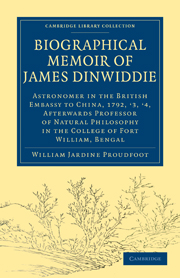 Biographical Memoir of James Dinwiddie, L.L.D., Astronomer in the British Embassy to China, 1792, '3, '4,
Biographical Memoir of James Dinwiddie, L.L.D., Astronomer in the British Embassy to China, 1792, '3, '4, Book contents
- Frontmatter
- TO THE READER
- Contents
- CHAP. I BIRTH, EARLY LIFE, AND A TEACHER OF YOUTH
- CHAP. II CAREER AS A PUBLIC LECTURER ON NATURAL PHILOSOPHY
- CHAP. III APPOINTMENT IN THE BRITISH EMBASSY TO CHINA—VOYAGE TO AND ARRIVAL AT PEKIN
- CHAP. IV RESIDENCE AT PEKIN
- CHAP. V DEPARTURE FROM PEKIN AND JOURNEY TO CANTON
- CHAP. VI RESIDENCE IN CANTON
- CHAP. VII TERMINATION OF THE EMBASSY—VOYAGE TO AND ARRIVAL IN INDIA
- CHAP. VIII RESIDENCE IN INDIA, AND APPOINTMENT AS PROFESSOR OF NATURAL PHILOSOPHY IN THE COLLEGE OF FORT WILLIAM
- CHAP. IX RETURN TO ENGLAND—DEATH
- LETTERS
CHAP. VII - TERMINATION OF THE EMBASSY—VOYAGE TO AND ARRIVAL IN INDIA
Published online by Cambridge University Press: 05 October 2010
- Frontmatter
- TO THE READER
- Contents
- CHAP. I BIRTH, EARLY LIFE, AND A TEACHER OF YOUTH
- CHAP. II CAREER AS A PUBLIC LECTURER ON NATURAL PHILOSOPHY
- CHAP. III APPOINTMENT IN THE BRITISH EMBASSY TO CHINA—VOYAGE TO AND ARRIVAL AT PEKIN
- CHAP. IV RESIDENCE AT PEKIN
- CHAP. V DEPARTURE FROM PEKIN AND JOURNEY TO CANTON
- CHAP. VI RESIDENCE IN CANTON
- CHAP. VII TERMINATION OF THE EMBASSY—VOYAGE TO AND ARRIVAL IN INDIA
- CHAP. VIII RESIDENCE IN INDIA, AND APPOINTMENT AS PROFESSOR OF NATURAL PHILOSOPHY IN THE COLLEGE OF FORT WILLIAM
- CHAP. IX RETURN TO ENGLAND—DEATH
- LETTERS
Summary
On the 8th March, the Ambassador and suite got finally aboard the Lion and Hindostan, and at the same time Dr. Dinwiddie took up his berth in the Jackall, the vessel appointed for India. However, they were not yet to sail, and here, for several days, he was left in a position for serious reflection on the events of the last sixteen months. “Thus,” he says, “the Embassy to me is ended. Its object was noble—the extension of commerce, and the improvement of science. With regard to the first, nothing that looks like an improvement has as yet taken place; and as to the other object, little could be done in a country where, while at Pekin, we were prisoners, and on our journey hurried forward with hardly time to look at an object, and without being able to converse with the inhabitants. To travel through a fine country—to see pagodas, canals, and manufacturing towns, without being able to ask a single question, is extremely mortifying. To be conducted to the bottom of the Linho, by a Colao of the Empire—to receive a present from the Emperor at parting, and the Colao's farewell speech, without knowing a word he said, and consequently to fall into numberless blunders in our attempt to reply—what information could we derive respecting the arts and sciences in a country where we could not converse with the inhabitants?
- Type
- Chapter
- Information
- Biographical Memoir of James Dinwiddie, L.L.D., Astronomer in the British Embassy to China, 1792, '3, '4,Afterwards Professor of Natural Philosophy in the College of Fort William, Bengal, pp. 86 - 97Publisher: Cambridge University PressPrint publication year: 2010First published in: 1868
